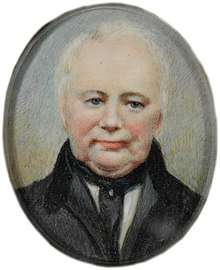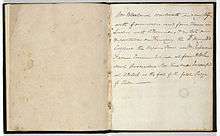William Lawson (explorer)
William Lawson (2 June 1774 – 16 June 1850) was an English-born Australian explorer, land owner, grazier and politician who migrated to Sydney, New South Wales in 1800. Along with his close friends and colleagues Gregory Blaxland and William Wentworth, he pioneered the first successful crossing of the Blue Mountains by European settlers.
William Lawson | |
|---|---|
 ca. 1840s – watercolour on ivory figure | |
| Member of Legislative Council of New South Wales | |
| In office 11 July 1843 – 20 June 1848 | |
| Personal details | |
| Born | 2 June 1774 Middlesex, England |
| Died | 16 June 1850 (aged 76) Prospect, NSW |
| Citizenship | |
| Relatives | John Street (son-in-law) |
| Known for | 1813 crossing of the Blue Mountains |
Early life and migration to Australia
Lawson was born in Finchley, Middlesex, England son of Scottish parents who had lived at Kirkpatrick. He trained as a surveyor but later bought a commission in the New South Wales Corps and migrated to Sydney, arriving in November 1800.[1] Shortly after his arrival he was posted to work at the military station at Norfolk Island. It was here that he met Sarah Leadbeater whom he married and had eleven children.[2]
By 1813, when Lawson was invited by Gregory Blaxland to join him in attempting to cross the Blue Mountains, he had become an established colonial officer and pastoralist in New South Wales with lands in Concord and Prospect.[2]
Crossing the Blue Mountains

Lawson commenced his exploration of the Blue Mountains alongside Blaxland and William Charles Wentworth on 11 May 1813. He kept a journal of the expedition titled, 'W Lawsons Narrative. Across Blue Mountains [sic]'.[3] In his first entry he writes:
Mr. Blaxland Wentworth and myself with four men and four Horses- Laden with Provisions etc- took our Departure on Tuesday the 11th May 1813. Crossed the Nepean River at Mr. Chapman's Farm Emma Island at four o'clock and proceeded SW. Two miles. Encamped at 5 o'clock at the foot of the first [Nioji] of Hills-.[3]
On 31 May 1813, the party reached the most westerly point of their expedition, now known as Mount Blaxland.[2] On this day, Lawson writes:
...this Country will I have no doubt be a great acquisition to this Colony and no difficulty in making a good Road to it, and take it in a Political point of View if in case of our Invasion it will be a safe Retreat for the Inhabitance with their Familys and that for this part of the Country is so formed by Nature that a few men would be able to defend the passes against a large body.[3]
Later life
After the crossing, Lawson, like Blaxland and Wentworth, was rewarded with a grant of 1,000 acres (4 km²) of land by Governor Macquarie. He selected his land along the Campbells River, part of the Bathurst settlement for which he was appointed Commandant until his retirement in 1824. Whilst Commandant he continued to undertake expeditions, and in 1821, with Constable Blackman, discovered the Cudgegong River and further explored Mudgee and its outlying regions.[4]
After Lawson retired from the army he entered politics and became a member of the New South Wales Legislative Council for County of Cumberland from 1843 to 1848.[5] He died at his estate, Veteran Hall in Prospect, on 16 June 1850.[4] The town of Lawson in the Blue Mountains is named after him.
Following Lawson's death, Veteran Hall was eventually acquired by the Metropolitan Water Board and most of the granted property is now submerged by the waters of Prospect reservoir. The house was demolished in 1926. His daughter Susanna Caroline Lawson married John Rendell Street, founder of the Street dynasty.[1]
In 1963 Lawson was honoured, together with Blaxland and Wentworth, on a postage stamp issued by Australia Post depicting the Blue Mountains crossing.[6]
References
- Dunlop, E W. "Lawson, William (1774–1850)". Australian Dictionary of Biography. Melbourne University Press. ISSN 1833-7538. Retrieved 11 April 2013 – via National Centre of Biography, Australian National University.
- Jensen, Jo; Peta Barrett (1997). Blaxland, Lawson & Wentworth. Slacks Creek, Qld: Future Horizon Publishing. ISBN 0958762295.
- "Lawson's journal – 1813". Discover Collections. State Library of NSW. 1822.
- Percival Serle. "Lawson, William (1774–1850)". Dictionary of Australian Biography. Angus and Robertson (1949). Retrieved 11 September 2014.
- "Mr William Lawson (1774–1860)". Former Members of the Parliament of New South Wales. Retrieved 17 April 2019.
- Australian 5d postage stamp showing Blaxland, Lawson and Wentworth's mountain crossing. australianstamp.com
Additional resources listed by the Australian Dictionary of Biography
- Historical Records of New South Wales, vols 4–7
- Historical Records of Australia, Series I, vols 3–8, 10, 11, 13, 14, 16
- H. Selkirk, ‘Discovery of Mudgee’, Journal of the Royal Australian Historical Society, 8 (1922)
- C. H. Bertie, ‘The Lawsons’, Home (Sydney), 1 January 1932
- E. C. Lawson, Lawson of Veteran Hall (microfilm, State Library of New South Wales)
- "William Lawson, Explorer And The First Of Our Squatters". The Farmer & Settler. L (12). New South Wales, Australia. 10 December 1954. p. 17 – via National Library of Australia.
- Bonwick transcripts, biography, vol 3 (State Library of New South Wales).
External links
- – William Lawson crossing the Blue Mountains – State Library of NSW
- Tony Dawson (2012). "Lawson, William". Dictionary of Sydney. Dictionary of Sydney Trust. Retrieved 9 October 2015.
| New South Wales Legislative Council | ||
|---|---|---|
| New creation | Member for County of Cumberland Jul 1843 – Jun 1848 With: Charles Cowper |
Succeeded by Nelson Lawson |